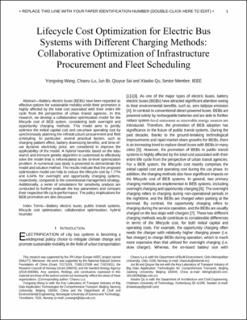| dc.contributor.author | Wang, Yongxing | |
| dc.contributor.author | Lu, Chaoru | |
| dc.contributor.author | Bi, Jun | |
| dc.contributor.author | Sai, Qiuyue | |
| dc.contributor.author | Qu, Xiaobo | |
| dc.date.accessioned | 2023-01-20T09:01:15Z | |
| dc.date.available | 2023-01-20T09:01:15Z | |
| dc.date.created | 2023-01-19T14:42:07Z | |
| dc.date.issued | 2022 | |
| dc.identifier.issn | 1524-9050 | |
| dc.identifier.uri | https://hdl.handle.net/11250/3044841 | |
| dc.description.abstract | Abstract—Battery electric buses (BEBs) have been regarded as effective options for sustainable mobility while their promotion is highly affected by the total cost associated with their entire life cycle from the perspective of urban transit agencies. In this research, we develop a collaborative optimization model for the lifecycle cost of BEB system, considering both overnight and opportunity charging methods. This model aims to jointly optimize the initial capital cost and use-phase operating cost by synchronously planning the infrastructure procurement and fleet scheduling. In particular, several practical factors, such as charging pattern effect, battery downsizing benefits, and time-ofuse dynamic electricity price, are considered to improve the applicability of the model. A hybrid heuristic based on the tabu search and immune genetic algorithm is customized to effectively solve the model that is reformulated as the bi-level optimization problem. A numerical case study is presented to demonstrate the model and solution method. The results indicate that the proposed optimization model can help to reduce the lifecycle cost by 7.77% and 6.64% for overnight and opportunity charging systems, respectively, compared to the conventional management strategy. Additionally, a series of simulations for sensitivity analysis are conducted to further evaluate the key parameters and compare their respective life cycle performance. The policy implications for BEB promotion are also discussed. | en_US |
| dc.language.iso | eng | en_US |
| dc.publisher | Institute of Electrical and Electronics Engineers | en_US |
| dc.subject | Battery electric buses | en_US |
| dc.subject | Public transit systems | en_US |
| dc.subject | Lifecycle cost optimization | en_US |
| dc.subject | Hybrid heuristic | en_US |
| dc.title | Lifecycle cost optimization for electric bus systems with different charging methods: Collaborative planning of infrastructure procurement and fleet scheduling | en_US |
| dc.type | Peer reviewed | en_US |
| dc.type | Journal article | en_US |
| dc.description.version | acceptedVersion | en_US |
| cristin.ispublished | false | |
| cristin.fulltext | postprint | |
| cristin.qualitycode | 1 | |
| dc.identifier.doi | 10.1109/TITS.2022.3223028. | |
| dc.identifier.cristin | 2110529 | |
| dc.source.journal | IEEE transactions on intelligent transportation systems (Print) | en_US |
